Employee Motivation and Performance Analysis
VerifiedAdded on 2020/11/12
|12
|3486
|349
AI Summary
This assignment requires a comprehensive analysis of employee motivation, engagement, and performance in organizations. It involves researching various studies and articles on the topic, analyzing the effects of performance appraisal systems, transformational leadership styles, and management control systems on employee commitment, job satisfaction, and productivity. The study also explores the impact of financial and non-financial rewards on employee motivation. A summary of the research findings and implications for organizations is required.
Contribute Materials
Your contribution can guide someone’s learning journey. Share your
documents today.
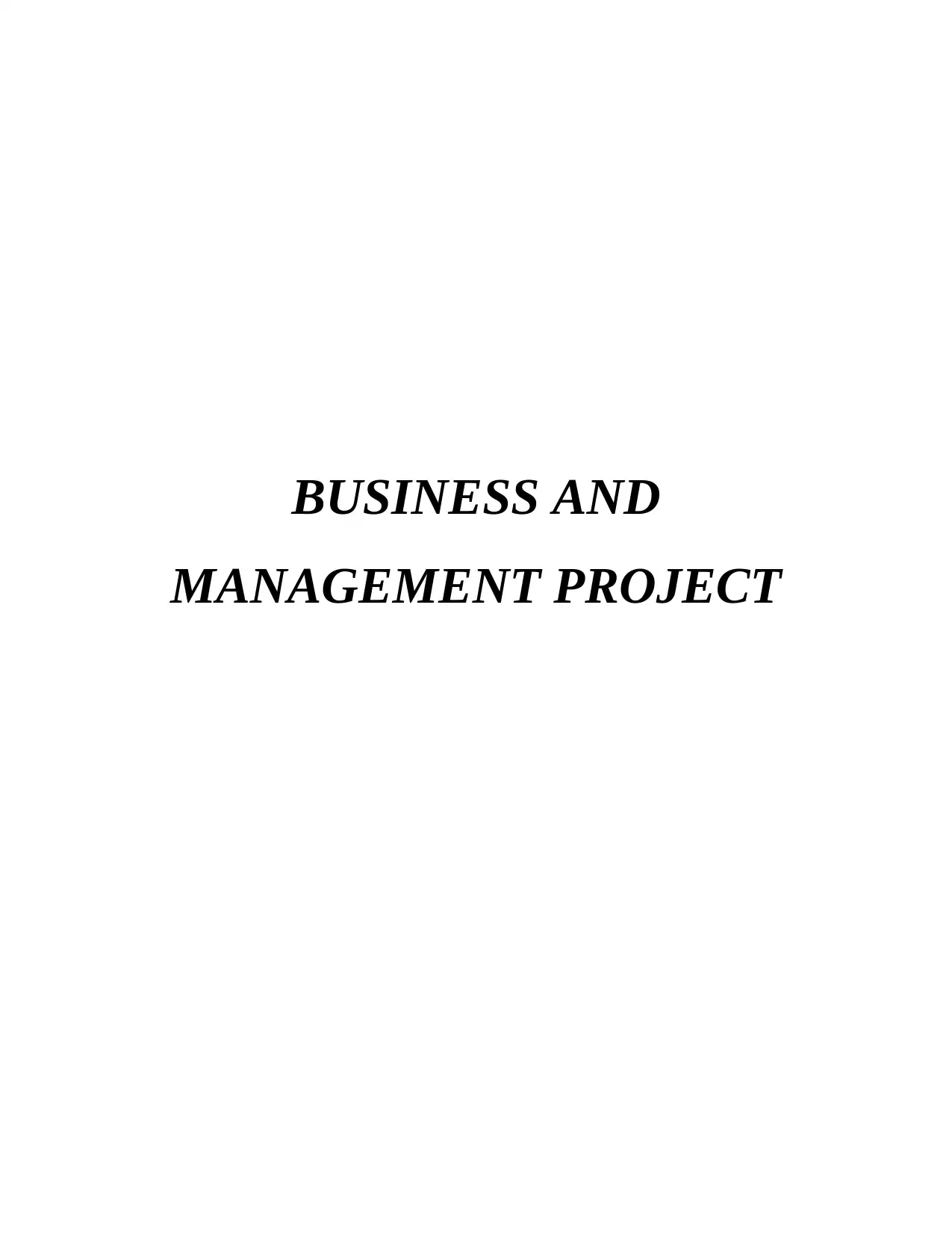
BUSINESS AND
MANAGEMENT PROJECT
MANAGEMENT PROJECT
Secure Best Marks with AI Grader
Need help grading? Try our AI Grader for instant feedback on your assignments.
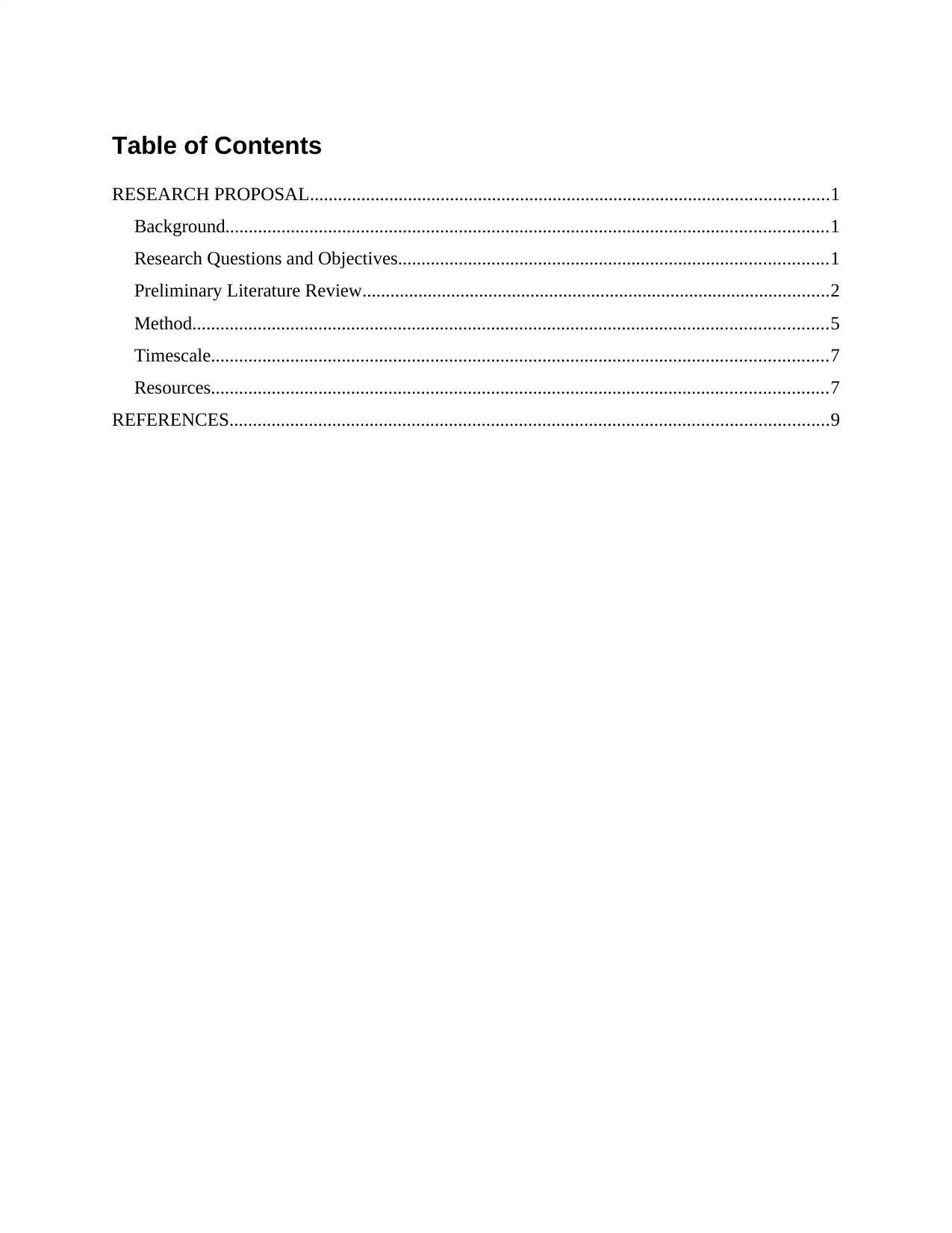
Table of Contents
RESEARCH PROPOSAL...............................................................................................................1
Background.................................................................................................................................1
Research Questions and Objectives............................................................................................1
Preliminary Literature Review....................................................................................................2
Method........................................................................................................................................5
Timescale....................................................................................................................................7
Resources....................................................................................................................................7
REFERENCES................................................................................................................................9
RESEARCH PROPOSAL...............................................................................................................1
Background.................................................................................................................................1
Research Questions and Objectives............................................................................................1
Preliminary Literature Review....................................................................................................2
Method........................................................................................................................................5
Timescale....................................................................................................................................7
Resources....................................................................................................................................7
REFERENCES................................................................................................................................9
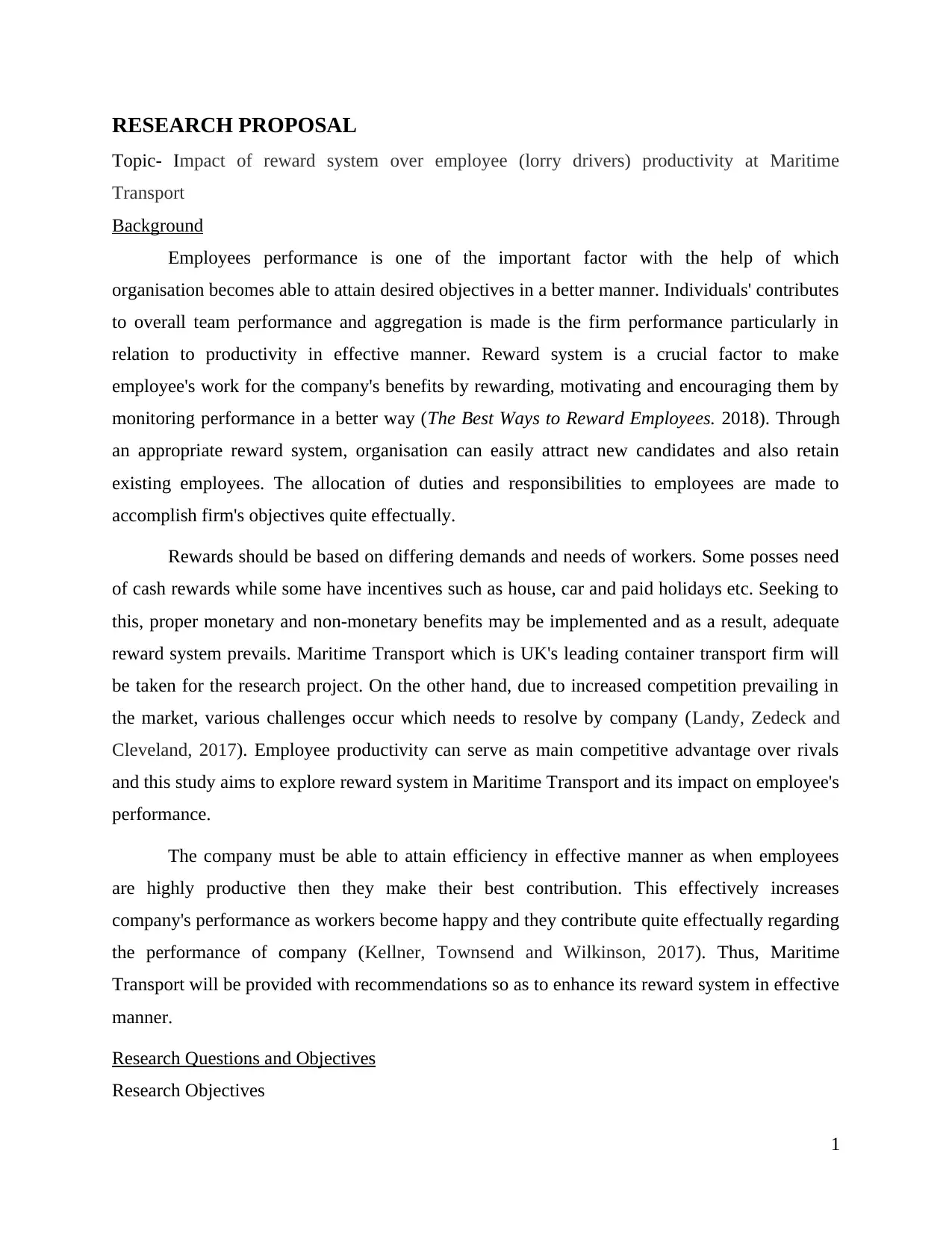
RESEARCH PROPOSAL
Topic- Impact of reward system over employee (lorry drivers) productivity at Maritime
Transport
Background
Employees performance is one of the important factor with the help of which
organisation becomes able to attain desired objectives in a better manner. Individuals' contributes
to overall team performance and aggregation is made is the firm performance particularly in
relation to productivity in effective manner. Reward system is a crucial factor to make
employee's work for the company's benefits by rewarding, motivating and encouraging them by
monitoring performance in a better way (The Best Ways to Reward Employees. 2018). Through
an appropriate reward system, organisation can easily attract new candidates and also retain
existing employees. The allocation of duties and responsibilities to employees are made to
accomplish firm's objectives quite effectually.
Rewards should be based on differing demands and needs of workers. Some posses need
of cash rewards while some have incentives such as house, car and paid holidays etc. Seeking to
this, proper monetary and non-monetary benefits may be implemented and as a result, adequate
reward system prevails. Maritime Transport which is UK's leading container transport firm will
be taken for the research project. On the other hand, due to increased competition prevailing in
the market, various challenges occur which needs to resolve by company (Landy, Zedeck and
Cleveland, 2017). Employee productivity can serve as main competitive advantage over rivals
and this study aims to explore reward system in Maritime Transport and its impact on employee's
performance.
The company must be able to attain efficiency in effective manner as when employees
are highly productive then they make their best contribution. This effectively increases
company's performance as workers become happy and they contribute quite effectually regarding
the performance of company (Kellner, Townsend and Wilkinson, 2017). Thus, Maritime
Transport will be provided with recommendations so as to enhance its reward system in effective
manner.
Research Questions and Objectives
Research Objectives
1
Topic- Impact of reward system over employee (lorry drivers) productivity at Maritime
Transport
Background
Employees performance is one of the important factor with the help of which
organisation becomes able to attain desired objectives in a better manner. Individuals' contributes
to overall team performance and aggregation is made is the firm performance particularly in
relation to productivity in effective manner. Reward system is a crucial factor to make
employee's work for the company's benefits by rewarding, motivating and encouraging them by
monitoring performance in a better way (The Best Ways to Reward Employees. 2018). Through
an appropriate reward system, organisation can easily attract new candidates and also retain
existing employees. The allocation of duties and responsibilities to employees are made to
accomplish firm's objectives quite effectually.
Rewards should be based on differing demands and needs of workers. Some posses need
of cash rewards while some have incentives such as house, car and paid holidays etc. Seeking to
this, proper monetary and non-monetary benefits may be implemented and as a result, adequate
reward system prevails. Maritime Transport which is UK's leading container transport firm will
be taken for the research project. On the other hand, due to increased competition prevailing in
the market, various challenges occur which needs to resolve by company (Landy, Zedeck and
Cleveland, 2017). Employee productivity can serve as main competitive advantage over rivals
and this study aims to explore reward system in Maritime Transport and its impact on employee's
performance.
The company must be able to attain efficiency in effective manner as when employees
are highly productive then they make their best contribution. This effectively increases
company's performance as workers become happy and they contribute quite effectually regarding
the performance of company (Kellner, Townsend and Wilkinson, 2017). Thus, Maritime
Transport will be provided with recommendations so as to enhance its reward system in effective
manner.
Research Questions and Objectives
Research Objectives
1
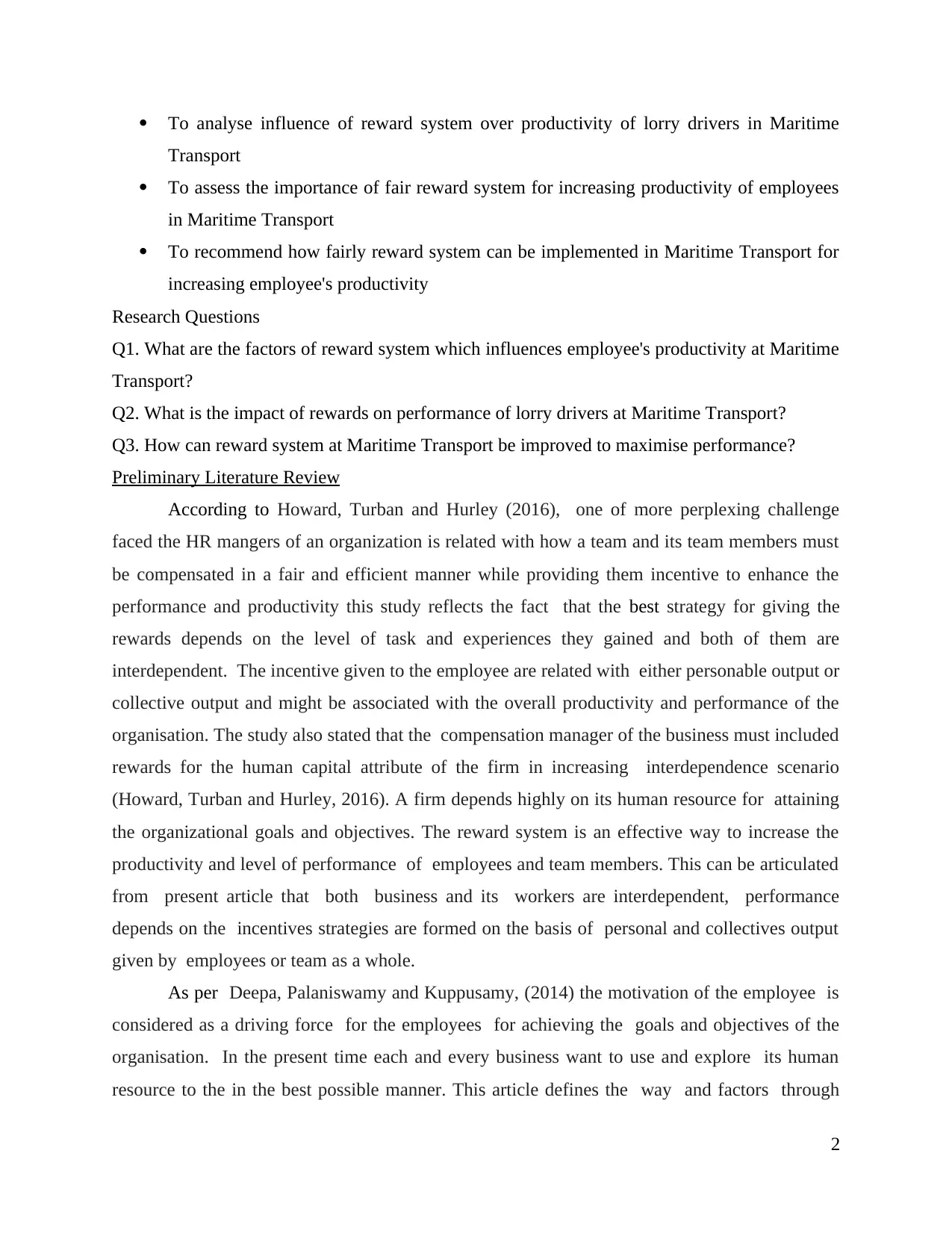
To analyse influence of reward system over productivity of lorry drivers in Maritime
Transport
To assess the importance of fair reward system for increasing productivity of employees
in Maritime Transport
To recommend how fairly reward system can be implemented in Maritime Transport for
increasing employee's productivity
Research Questions
Q1. What are the factors of reward system which influences employee's productivity at Maritime
Transport?
Q2. What is the impact of rewards on performance of lorry drivers at Maritime Transport?
Q3. How can reward system at Maritime Transport be improved to maximise performance?
Preliminary Literature Review
According to Howard, Turban and Hurley (2016), one of more perplexing challenge
faced the HR mangers of an organization is related with how a team and its team members must
be compensated in a fair and efficient manner while providing them incentive to enhance the
performance and productivity this study reflects the fact that the best strategy for giving the
rewards depends on the level of task and experiences they gained and both of them are
interdependent. The incentive given to the employee are related with either personable output or
collective output and might be associated with the overall productivity and performance of the
organisation. The study also stated that the compensation manager of the business must included
rewards for the human capital attribute of the firm in increasing interdependence scenario
(Howard, Turban and Hurley, 2016). A firm depends highly on its human resource for attaining
the organizational goals and objectives. The reward system is an effective way to increase the
productivity and level of performance of employees and team members. This can be articulated
from present article that both business and its workers are interdependent, performance
depends on the incentives strategies are formed on the basis of personal and collectives output
given by employees or team as a whole.
As per Deepa, Palaniswamy and Kuppusamy, (2014) the motivation of the employee is
considered as a driving force for the employees for achieving the goals and objectives of the
organisation. In the present time each and every business want to use and explore its human
resource to the in the best possible manner. This article defines the way and factors through
2
Transport
To assess the importance of fair reward system for increasing productivity of employees
in Maritime Transport
To recommend how fairly reward system can be implemented in Maritime Transport for
increasing employee's productivity
Research Questions
Q1. What are the factors of reward system which influences employee's productivity at Maritime
Transport?
Q2. What is the impact of rewards on performance of lorry drivers at Maritime Transport?
Q3. How can reward system at Maritime Transport be improved to maximise performance?
Preliminary Literature Review
According to Howard, Turban and Hurley (2016), one of more perplexing challenge
faced the HR mangers of an organization is related with how a team and its team members must
be compensated in a fair and efficient manner while providing them incentive to enhance the
performance and productivity this study reflects the fact that the best strategy for giving the
rewards depends on the level of task and experiences they gained and both of them are
interdependent. The incentive given to the employee are related with either personable output or
collective output and might be associated with the overall productivity and performance of the
organisation. The study also stated that the compensation manager of the business must included
rewards for the human capital attribute of the firm in increasing interdependence scenario
(Howard, Turban and Hurley, 2016). A firm depends highly on its human resource for attaining
the organizational goals and objectives. The reward system is an effective way to increase the
productivity and level of performance of employees and team members. This can be articulated
from present article that both business and its workers are interdependent, performance
depends on the incentives strategies are formed on the basis of personal and collectives output
given by employees or team as a whole.
As per Deepa, Palaniswamy and Kuppusamy, (2014) the motivation of the employee is
considered as a driving force for the employees for achieving the goals and objectives of the
organisation. In the present time each and every business want to use and explore its human
resource to the in the best possible manner. This article defines the way and factors through
2
Secure Best Marks with AI Grader
Need help grading? Try our AI Grader for instant feedback on your assignments.
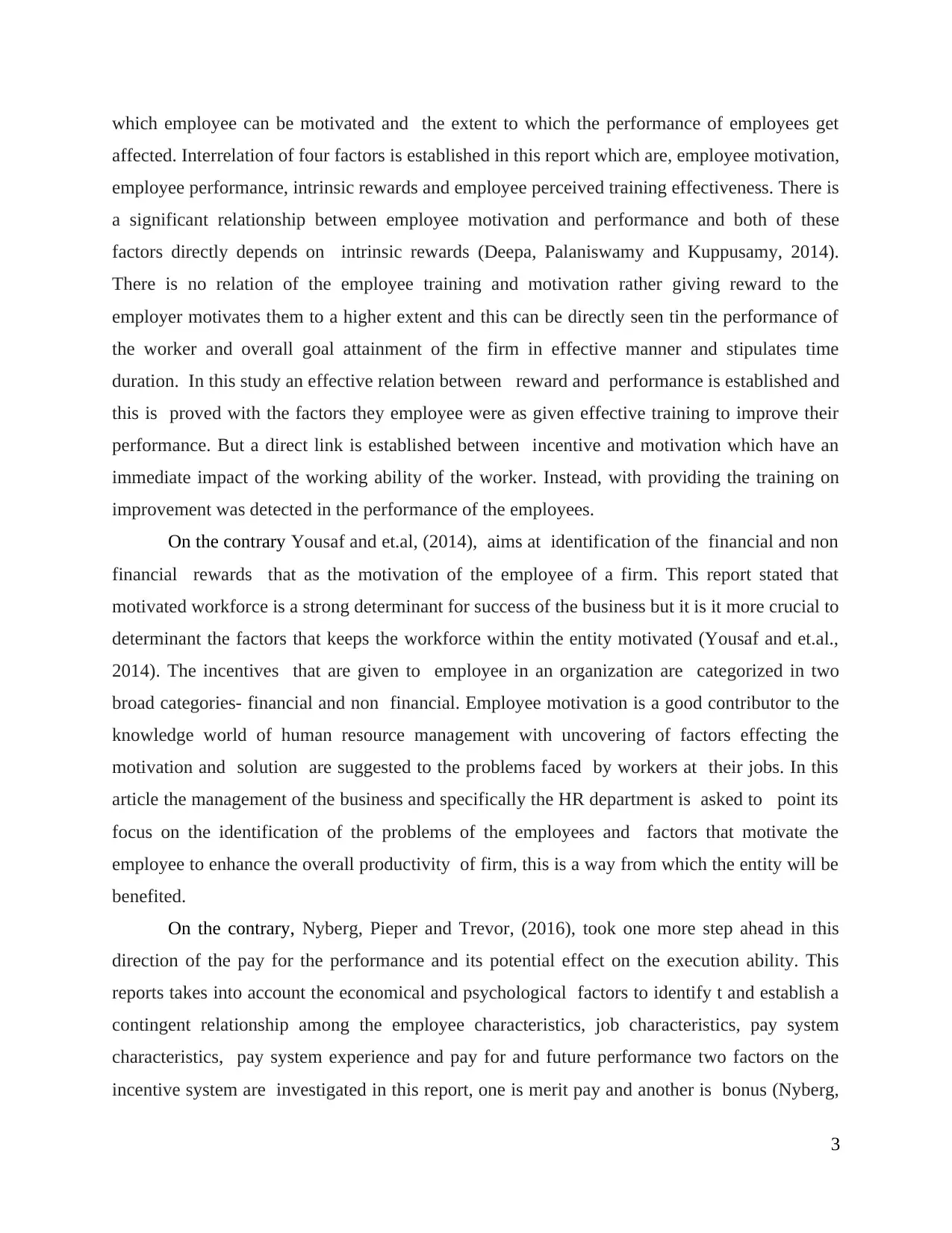
which employee can be motivated and the extent to which the performance of employees get
affected. Interrelation of four factors is established in this report which are, employee motivation,
employee performance, intrinsic rewards and employee perceived training effectiveness. There is
a significant relationship between employee motivation and performance and both of these
factors directly depends on intrinsic rewards (Deepa, Palaniswamy and Kuppusamy, 2014).
There is no relation of the employee training and motivation rather giving reward to the
employer motivates them to a higher extent and this can be directly seen tin the performance of
the worker and overall goal attainment of the firm in effective manner and stipulates time
duration. In this study an effective relation between reward and performance is established and
this is proved with the factors they employee were as given effective training to improve their
performance. But a direct link is established between incentive and motivation which have an
immediate impact of the working ability of the worker. Instead, with providing the training on
improvement was detected in the performance of the employees.
On the contrary Yousaf and et.al, (2014), aims at identification of the financial and non
financial rewards that as the motivation of the employee of a firm. This report stated that
motivated workforce is a strong determinant for success of the business but it is it more crucial to
determinant the factors that keeps the workforce within the entity motivated (Yousaf and et.al.,
2014). The incentives that are given to employee in an organization are categorized in two
broad categories- financial and non financial. Employee motivation is a good contributor to the
knowledge world of human resource management with uncovering of factors effecting the
motivation and solution are suggested to the problems faced by workers at their jobs. In this
article the management of the business and specifically the HR department is asked to point its
focus on the identification of the problems of the employees and factors that motivate the
employee to enhance the overall productivity of firm, this is a way from which the entity will be
benefited.
On the contrary, Nyberg, Pieper and Trevor, (2016), took one more step ahead in this
direction of the pay for the performance and its potential effect on the execution ability. This
reports takes into account the economical and psychological factors to identify t and establish a
contingent relationship among the employee characteristics, job characteristics, pay system
characteristics, pay system experience and pay for and future performance two factors on the
incentive system are investigated in this report, one is merit pay and another is bonus (Nyberg,
3
affected. Interrelation of four factors is established in this report which are, employee motivation,
employee performance, intrinsic rewards and employee perceived training effectiveness. There is
a significant relationship between employee motivation and performance and both of these
factors directly depends on intrinsic rewards (Deepa, Palaniswamy and Kuppusamy, 2014).
There is no relation of the employee training and motivation rather giving reward to the
employer motivates them to a higher extent and this can be directly seen tin the performance of
the worker and overall goal attainment of the firm in effective manner and stipulates time
duration. In this study an effective relation between reward and performance is established and
this is proved with the factors they employee were as given effective training to improve their
performance. But a direct link is established between incentive and motivation which have an
immediate impact of the working ability of the worker. Instead, with providing the training on
improvement was detected in the performance of the employees.
On the contrary Yousaf and et.al, (2014), aims at identification of the financial and non
financial rewards that as the motivation of the employee of a firm. This report stated that
motivated workforce is a strong determinant for success of the business but it is it more crucial to
determinant the factors that keeps the workforce within the entity motivated (Yousaf and et.al.,
2014). The incentives that are given to employee in an organization are categorized in two
broad categories- financial and non financial. Employee motivation is a good contributor to the
knowledge world of human resource management with uncovering of factors effecting the
motivation and solution are suggested to the problems faced by workers at their jobs. In this
article the management of the business and specifically the HR department is asked to point its
focus on the identification of the problems of the employees and factors that motivate the
employee to enhance the overall productivity of firm, this is a way from which the entity will be
benefited.
On the contrary, Nyberg, Pieper and Trevor, (2016), took one more step ahead in this
direction of the pay for the performance and its potential effect on the execution ability. This
reports takes into account the economical and psychological factors to identify t and establish a
contingent relationship among the employee characteristics, job characteristics, pay system
characteristics, pay system experience and pay for and future performance two factors on the
incentive system are investigated in this report, one is merit pay and another is bonus (Nyberg,
3
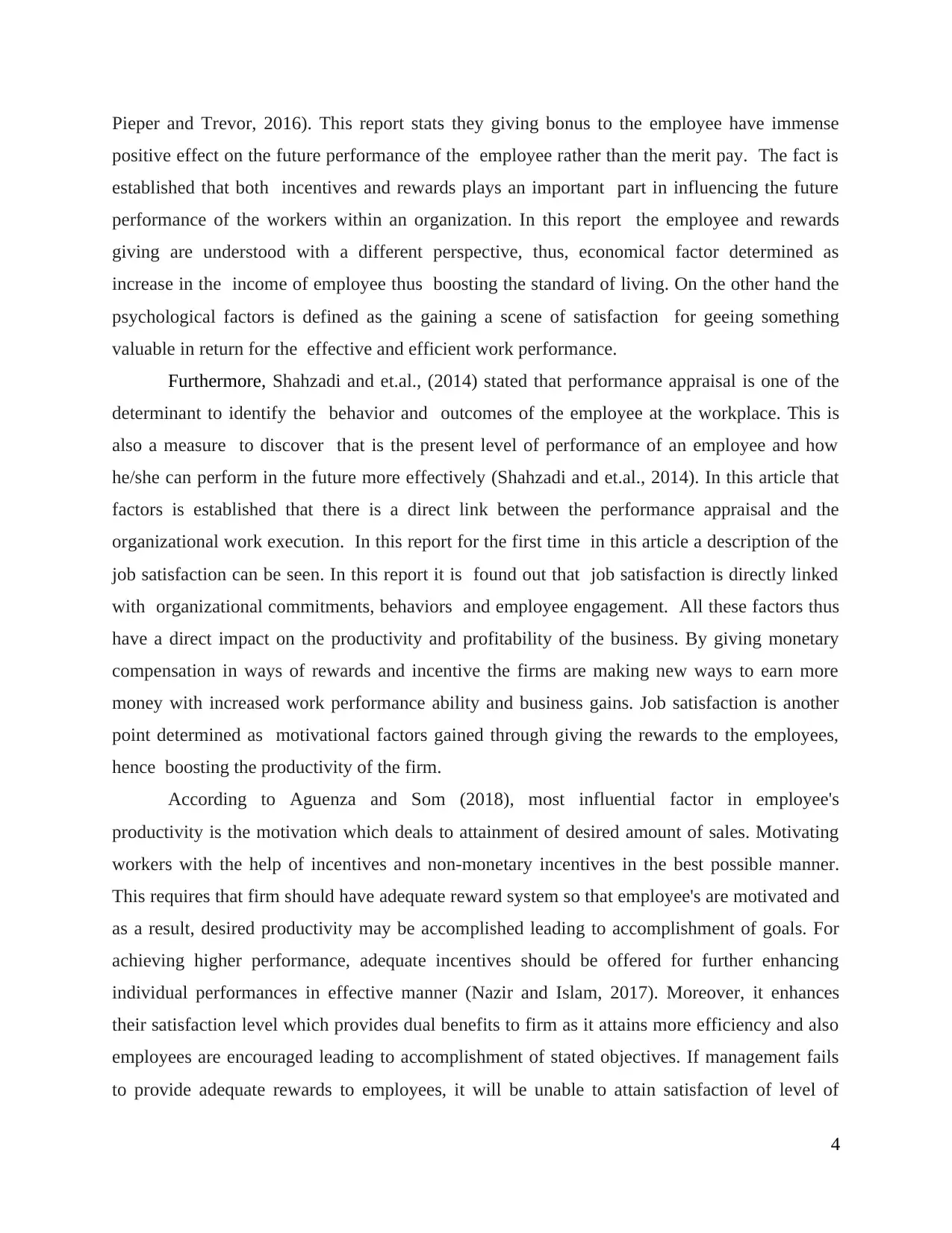
Pieper and Trevor, 2016). This report stats they giving bonus to the employee have immense
positive effect on the future performance of the employee rather than the merit pay. The fact is
established that both incentives and rewards plays an important part in influencing the future
performance of the workers within an organization. In this report the employee and rewards
giving are understood with a different perspective, thus, economical factor determined as
increase in the income of employee thus boosting the standard of living. On the other hand the
psychological factors is defined as the gaining a scene of satisfaction for geeing something
valuable in return for the effective and efficient work performance.
Furthermore, Shahzadi and et.al., (2014) stated that performance appraisal is one of the
determinant to identify the behavior and outcomes of the employee at the workplace. This is
also a measure to discover that is the present level of performance of an employee and how
he/she can perform in the future more effectively (Shahzadi and et.al., 2014). In this article that
factors is established that there is a direct link between the performance appraisal and the
organizational work execution. In this report for the first time in this article a description of the
job satisfaction can be seen. In this report it is found out that job satisfaction is directly linked
with organizational commitments, behaviors and employee engagement. All these factors thus
have a direct impact on the productivity and profitability of the business. By giving monetary
compensation in ways of rewards and incentive the firms are making new ways to earn more
money with increased work performance ability and business gains. Job satisfaction is another
point determined as motivational factors gained through giving the rewards to the employees,
hence boosting the productivity of the firm.
According to Aguenza and Som (2018), most influential factor in employee's
productivity is the motivation which deals to attainment of desired amount of sales. Motivating
workers with the help of incentives and non-monetary incentives in the best possible manner.
This requires that firm should have adequate reward system so that employee's are motivated and
as a result, desired productivity may be accomplished leading to accomplishment of goals. For
achieving higher performance, adequate incentives should be offered for further enhancing
individual performances in effective manner (Nazir and Islam, 2017). Moreover, it enhances
their satisfaction level which provides dual benefits to firm as it attains more efficiency and also
employees are encouraged leading to accomplishment of stated objectives. If management fails
to provide adequate rewards to employees, it will be unable to attain satisfaction of level of
4
positive effect on the future performance of the employee rather than the merit pay. The fact is
established that both incentives and rewards plays an important part in influencing the future
performance of the workers within an organization. In this report the employee and rewards
giving are understood with a different perspective, thus, economical factor determined as
increase in the income of employee thus boosting the standard of living. On the other hand the
psychological factors is defined as the gaining a scene of satisfaction for geeing something
valuable in return for the effective and efficient work performance.
Furthermore, Shahzadi and et.al., (2014) stated that performance appraisal is one of the
determinant to identify the behavior and outcomes of the employee at the workplace. This is
also a measure to discover that is the present level of performance of an employee and how
he/she can perform in the future more effectively (Shahzadi and et.al., 2014). In this article that
factors is established that there is a direct link between the performance appraisal and the
organizational work execution. In this report for the first time in this article a description of the
job satisfaction can be seen. In this report it is found out that job satisfaction is directly linked
with organizational commitments, behaviors and employee engagement. All these factors thus
have a direct impact on the productivity and profitability of the business. By giving monetary
compensation in ways of rewards and incentive the firms are making new ways to earn more
money with increased work performance ability and business gains. Job satisfaction is another
point determined as motivational factors gained through giving the rewards to the employees,
hence boosting the productivity of the firm.
According to Aguenza and Som (2018), most influential factor in employee's
productivity is the motivation which deals to attainment of desired amount of sales. Motivating
workers with the help of incentives and non-monetary incentives in the best possible manner.
This requires that firm should have adequate reward system so that employee's are motivated and
as a result, desired productivity may be accomplished leading to accomplishment of goals. For
achieving higher performance, adequate incentives should be offered for further enhancing
individual performances in effective manner (Nazir and Islam, 2017). Moreover, it enhances
their satisfaction level which provides dual benefits to firm as it attains more efficiency and also
employees are encouraged leading to accomplishment of stated objectives. If management fails
to provide adequate rewards to employees, it will be unable to attain satisfaction of level of
4
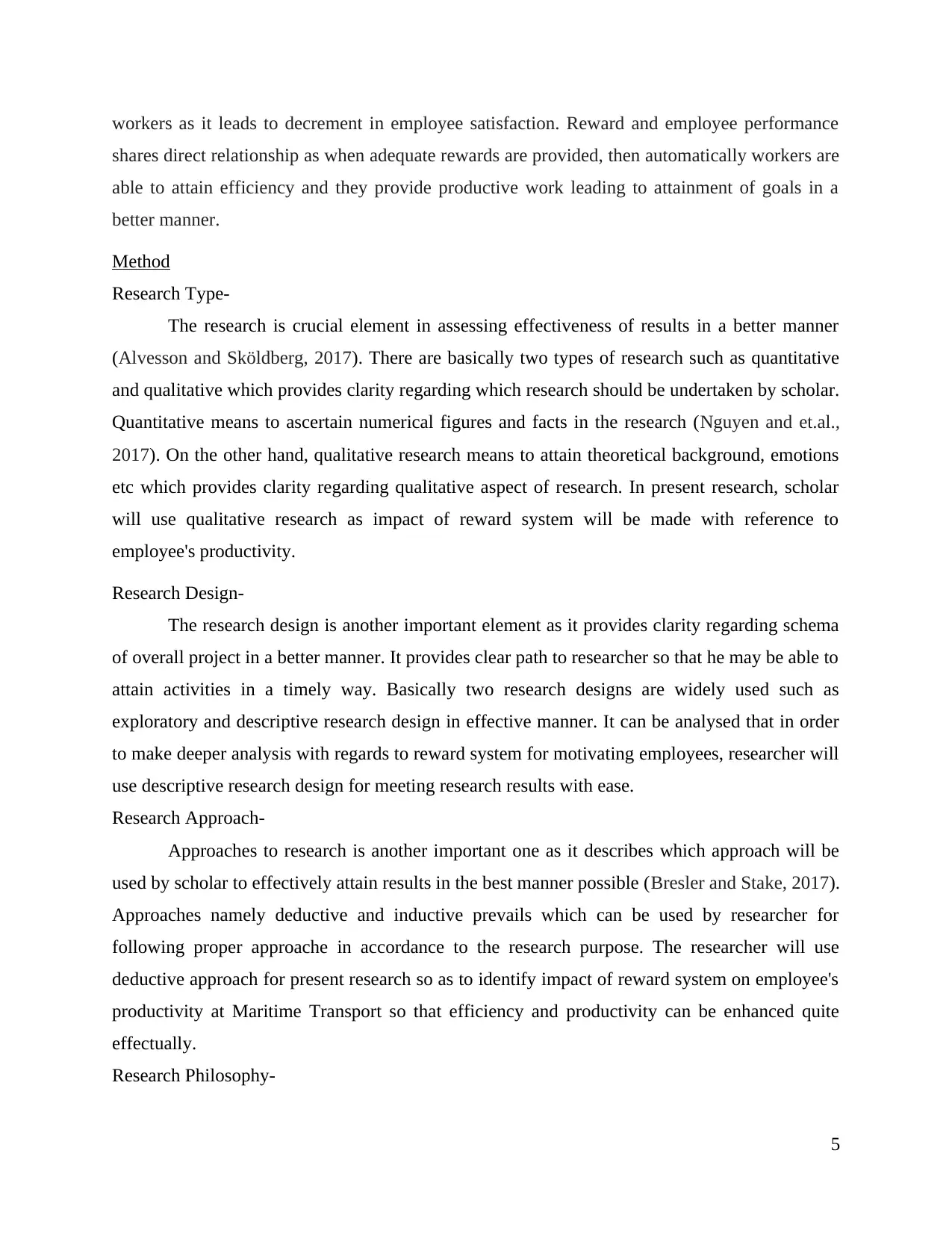
workers as it leads to decrement in employee satisfaction. Reward and employee performance
shares direct relationship as when adequate rewards are provided, then automatically workers are
able to attain efficiency and they provide productive work leading to attainment of goals in a
better manner.
Method
Research Type-
The research is crucial element in assessing effectiveness of results in a better manner
(Alvesson and Sköldberg, 2017). There are basically two types of research such as quantitative
and qualitative which provides clarity regarding which research should be undertaken by scholar.
Quantitative means to ascertain numerical figures and facts in the research (Nguyen and et.al.,
2017). On the other hand, qualitative research means to attain theoretical background, emotions
etc which provides clarity regarding qualitative aspect of research. In present research, scholar
will use qualitative research as impact of reward system will be made with reference to
employee's productivity.
Research Design-
The research design is another important element as it provides clarity regarding schema
of overall project in a better manner. It provides clear path to researcher so that he may be able to
attain activities in a timely way. Basically two research designs are widely used such as
exploratory and descriptive research design in effective manner. It can be analysed that in order
to make deeper analysis with regards to reward system for motivating employees, researcher will
use descriptive research design for meeting research results with ease.
Research Approach-
Approaches to research is another important one as it describes which approach will be
used by scholar to effectively attain results in the best manner possible (Bresler and Stake, 2017).
Approaches namely deductive and inductive prevails which can be used by researcher for
following proper approache in accordance to the research purpose. The researcher will use
deductive approach for present research so as to identify impact of reward system on employee's
productivity at Maritime Transport so that efficiency and productivity can be enhanced quite
effectually.
Research Philosophy-
5
shares direct relationship as when adequate rewards are provided, then automatically workers are
able to attain efficiency and they provide productive work leading to attainment of goals in a
better manner.
Method
Research Type-
The research is crucial element in assessing effectiveness of results in a better manner
(Alvesson and Sköldberg, 2017). There are basically two types of research such as quantitative
and qualitative which provides clarity regarding which research should be undertaken by scholar.
Quantitative means to ascertain numerical figures and facts in the research (Nguyen and et.al.,
2017). On the other hand, qualitative research means to attain theoretical background, emotions
etc which provides clarity regarding qualitative aspect of research. In present research, scholar
will use qualitative research as impact of reward system will be made with reference to
employee's productivity.
Research Design-
The research design is another important element as it provides clarity regarding schema
of overall project in a better manner. It provides clear path to researcher so that he may be able to
attain activities in a timely way. Basically two research designs are widely used such as
exploratory and descriptive research design in effective manner. It can be analysed that in order
to make deeper analysis with regards to reward system for motivating employees, researcher will
use descriptive research design for meeting research results with ease.
Research Approach-
Approaches to research is another important one as it describes which approach will be
used by scholar to effectively attain results in the best manner possible (Bresler and Stake, 2017).
Approaches namely deductive and inductive prevails which can be used by researcher for
following proper approache in accordance to the research purpose. The researcher will use
deductive approach for present research so as to identify impact of reward system on employee's
productivity at Maritime Transport so that efficiency and productivity can be enhanced quite
effectually.
Research Philosophy-
5
Paraphrase This Document
Need a fresh take? Get an instant paraphrase of this document with our AI Paraphraser
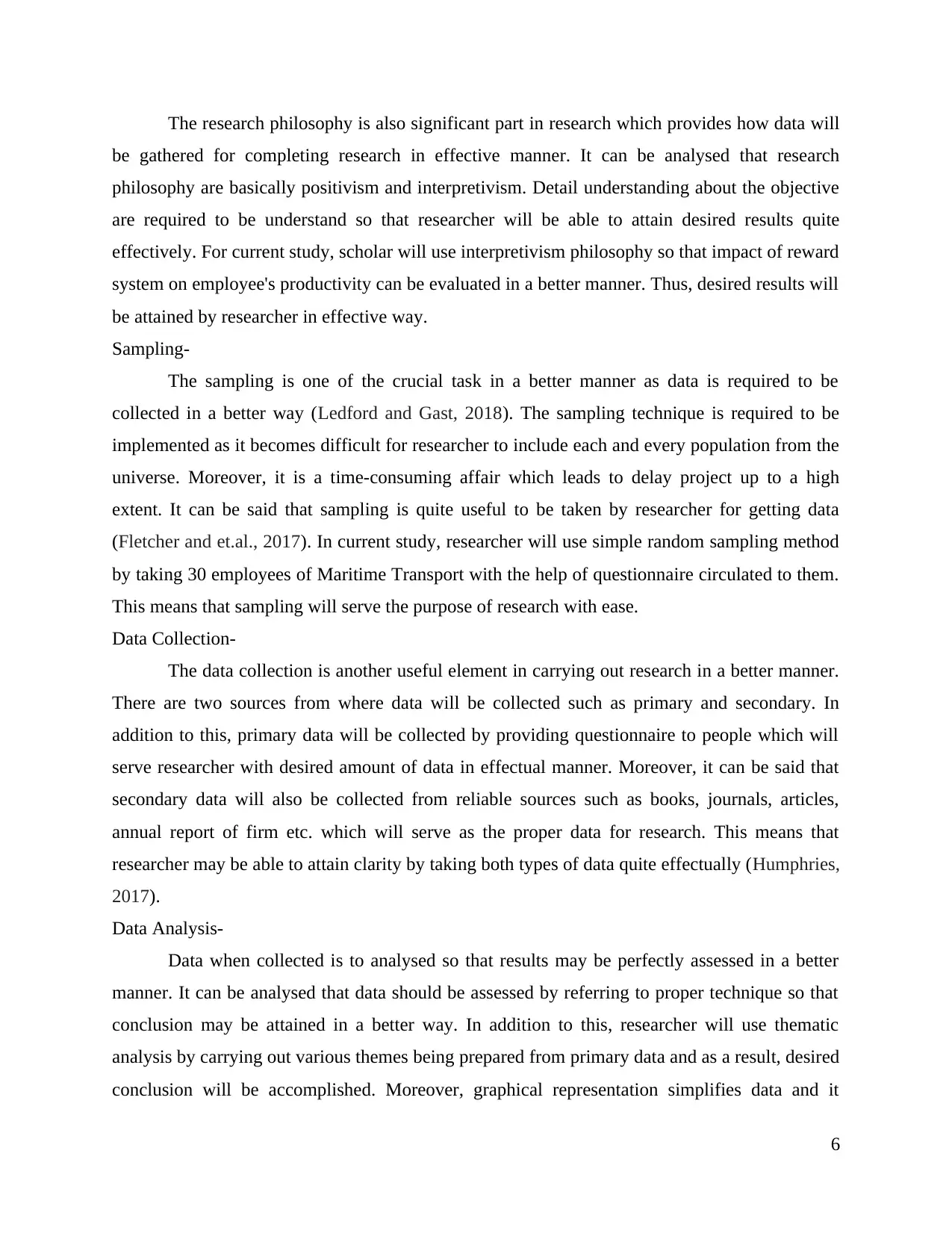
The research philosophy is also significant part in research which provides how data will
be gathered for completing research in effective manner. It can be analysed that research
philosophy are basically positivism and interpretivism. Detail understanding about the objective
are required to be understand so that researcher will be able to attain desired results quite
effectively. For current study, scholar will use interpretivism philosophy so that impact of reward
system on employee's productivity can be evaluated in a better manner. Thus, desired results will
be attained by researcher in effective way.
Sampling-
The sampling is one of the crucial task in a better manner as data is required to be
collected in a better way (Ledford and Gast, 2018). The sampling technique is required to be
implemented as it becomes difficult for researcher to include each and every population from the
universe. Moreover, it is a time-consuming affair which leads to delay project up to a high
extent. It can be said that sampling is quite useful to be taken by researcher for getting data
(Fletcher and et.al., 2017). In current study, researcher will use simple random sampling method
by taking 30 employees of Maritime Transport with the help of questionnaire circulated to them.
This means that sampling will serve the purpose of research with ease.
Data Collection-
The data collection is another useful element in carrying out research in a better manner.
There are two sources from where data will be collected such as primary and secondary. In
addition to this, primary data will be collected by providing questionnaire to people which will
serve researcher with desired amount of data in effectual manner. Moreover, it can be said that
secondary data will also be collected from reliable sources such as books, journals, articles,
annual report of firm etc. which will serve as the proper data for research. This means that
researcher may be able to attain clarity by taking both types of data quite effectually (Humphries,
2017).
Data Analysis-
Data when collected is to analysed so that results may be perfectly assessed in a better
manner. It can be analysed that data should be assessed by referring to proper technique so that
conclusion may be attained in a better way. In addition to this, researcher will use thematic
analysis by carrying out various themes being prepared from primary data and as a result, desired
conclusion will be accomplished. Moreover, graphical representation simplifies data and it
6
be gathered for completing research in effective manner. It can be analysed that research
philosophy are basically positivism and interpretivism. Detail understanding about the objective
are required to be understand so that researcher will be able to attain desired results quite
effectively. For current study, scholar will use interpretivism philosophy so that impact of reward
system on employee's productivity can be evaluated in a better manner. Thus, desired results will
be attained by researcher in effective way.
Sampling-
The sampling is one of the crucial task in a better manner as data is required to be
collected in a better way (Ledford and Gast, 2018). The sampling technique is required to be
implemented as it becomes difficult for researcher to include each and every population from the
universe. Moreover, it is a time-consuming affair which leads to delay project up to a high
extent. It can be said that sampling is quite useful to be taken by researcher for getting data
(Fletcher and et.al., 2017). In current study, researcher will use simple random sampling method
by taking 30 employees of Maritime Transport with the help of questionnaire circulated to them.
This means that sampling will serve the purpose of research with ease.
Data Collection-
The data collection is another useful element in carrying out research in a better manner.
There are two sources from where data will be collected such as primary and secondary. In
addition to this, primary data will be collected by providing questionnaire to people which will
serve researcher with desired amount of data in effectual manner. Moreover, it can be said that
secondary data will also be collected from reliable sources such as books, journals, articles,
annual report of firm etc. which will serve as the proper data for research. This means that
researcher may be able to attain clarity by taking both types of data quite effectually (Humphries,
2017).
Data Analysis-
Data when collected is to analysed so that results may be perfectly assessed in a better
manner. It can be analysed that data should be assessed by referring to proper technique so that
conclusion may be attained in a better way. In addition to this, researcher will use thematic
analysis by carrying out various themes being prepared from primary data and as a result, desired
conclusion will be accomplished. Moreover, graphical representation simplifies data and it
6
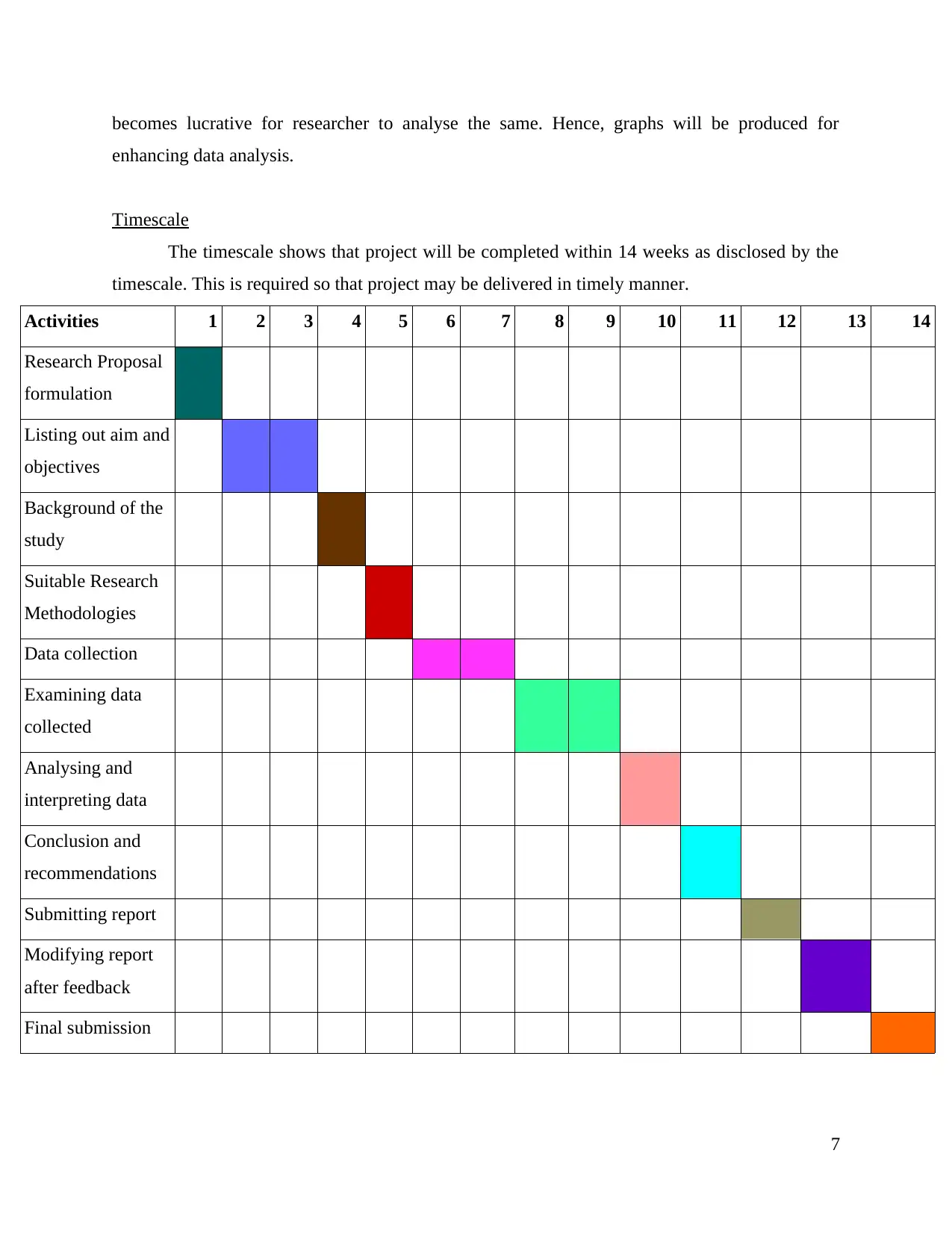
becomes lucrative for researcher to analyse the same. Hence, graphs will be produced for
enhancing data analysis.
Timescale
The timescale shows that project will be completed within 14 weeks as disclosed by the
timescale. This is required so that project may be delivered in timely manner.
Activities 1 2 3 4 5 6 7 8 9 10 11 12 13 14
Research Proposal
formulation
Listing out aim and
objectives
Background of the
study
Suitable Research
Methodologies
Data collection
Examining data
collected
Analysing and
interpreting data
Conclusion and
recommendations
Submitting report
Modifying report
after feedback
Final submission
7
enhancing data analysis.
Timescale
The timescale shows that project will be completed within 14 weeks as disclosed by the
timescale. This is required so that project may be delivered in timely manner.
Activities 1 2 3 4 5 6 7 8 9 10 11 12 13 14
Research Proposal
formulation
Listing out aim and
objectives
Background of the
study
Suitable Research
Methodologies
Data collection
Examining data
collected
Analysing and
interpreting data
Conclusion and
recommendations
Submitting report
Modifying report
after feedback
Final submission
7
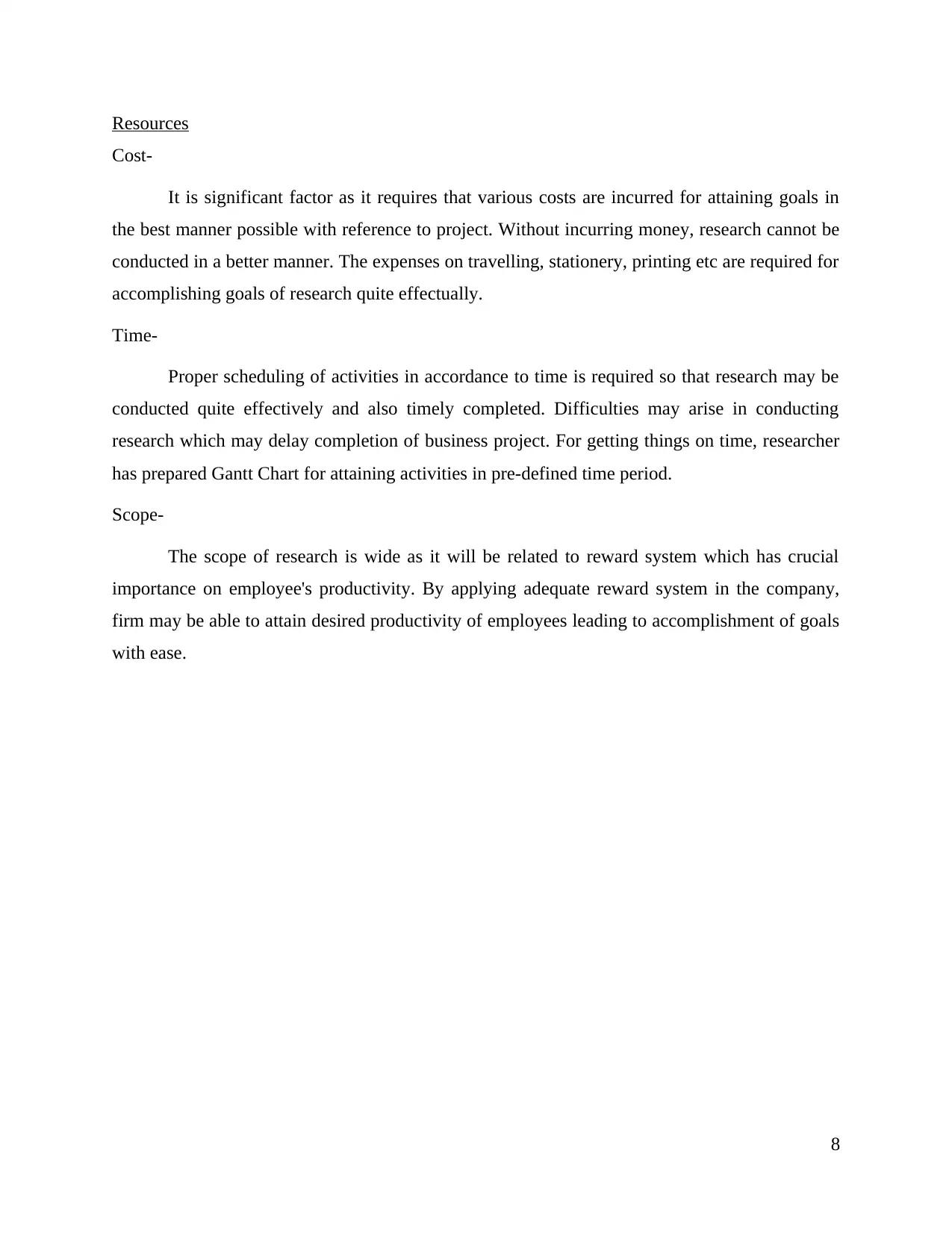
Resources
Cost-
It is significant factor as it requires that various costs are incurred for attaining goals in
the best manner possible with reference to project. Without incurring money, research cannot be
conducted in a better manner. The expenses on travelling, stationery, printing etc are required for
accomplishing goals of research quite effectually.
Time-
Proper scheduling of activities in accordance to time is required so that research may be
conducted quite effectively and also timely completed. Difficulties may arise in conducting
research which may delay completion of business project. For getting things on time, researcher
has prepared Gantt Chart for attaining activities in pre-defined time period.
Scope-
The scope of research is wide as it will be related to reward system which has crucial
importance on employee's productivity. By applying adequate reward system in the company,
firm may be able to attain desired productivity of employees leading to accomplishment of goals
with ease.
8
Cost-
It is significant factor as it requires that various costs are incurred for attaining goals in
the best manner possible with reference to project. Without incurring money, research cannot be
conducted in a better manner. The expenses on travelling, stationery, printing etc are required for
accomplishing goals of research quite effectually.
Time-
Proper scheduling of activities in accordance to time is required so that research may be
conducted quite effectively and also timely completed. Difficulties may arise in conducting
research which may delay completion of business project. For getting things on time, researcher
has prepared Gantt Chart for attaining activities in pre-defined time period.
Scope-
The scope of research is wide as it will be related to reward system which has crucial
importance on employee's productivity. By applying adequate reward system in the company,
firm may be able to attain desired productivity of employees leading to accomplishment of goals
with ease.
8
Secure Best Marks with AI Grader
Need help grading? Try our AI Grader for instant feedback on your assignments.
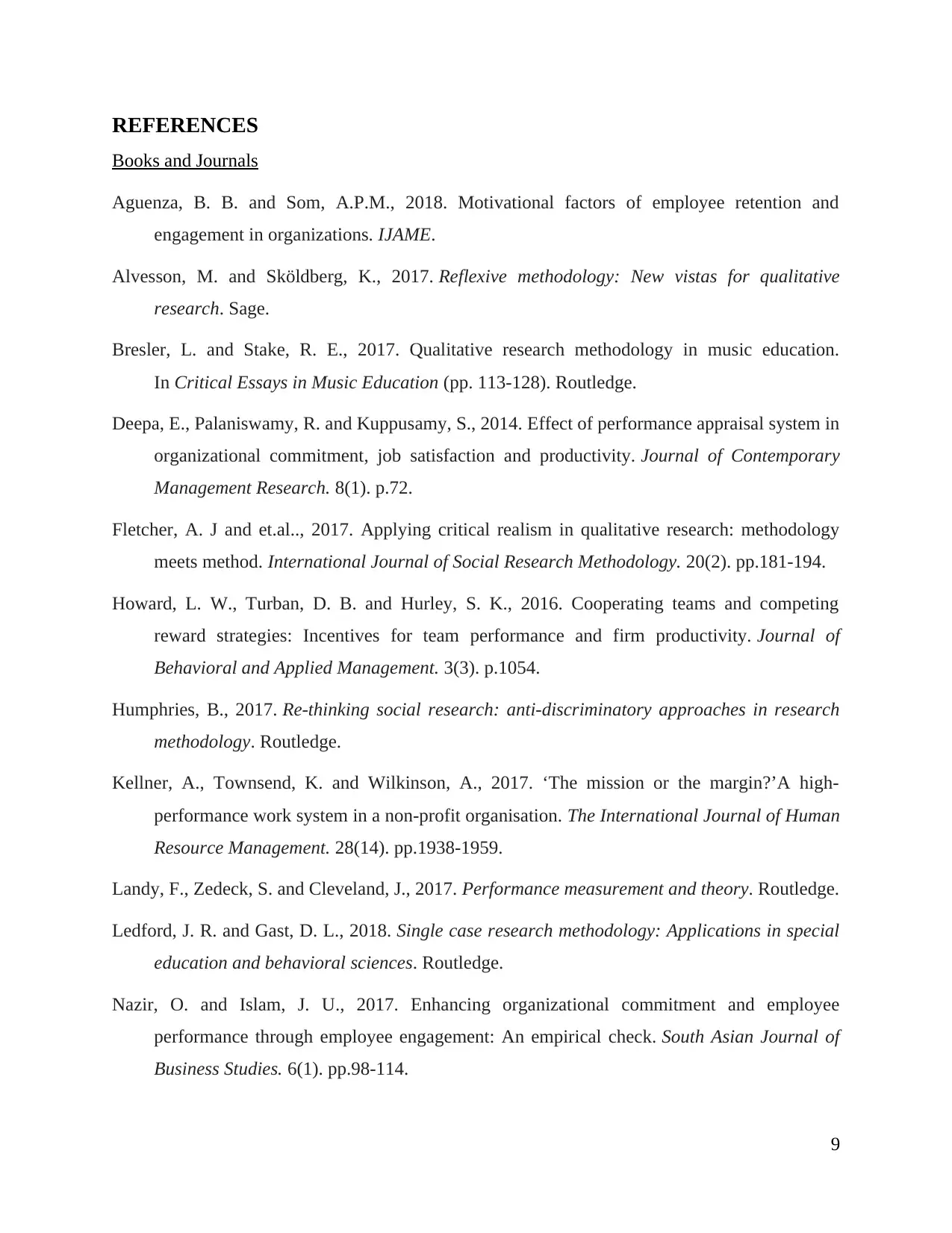
REFERENCES
Books and Journals
Aguenza, B. B. and Som, A.P.M., 2018. Motivational factors of employee retention and
engagement in organizations. IJAME.
Alvesson, M. and Sköldberg, K., 2017. Reflexive methodology: New vistas for qualitative
research. Sage.
Bresler, L. and Stake, R. E., 2017. Qualitative research methodology in music education.
In Critical Essays in Music Education (pp. 113-128). Routledge.
Deepa, E., Palaniswamy, R. and Kuppusamy, S., 2014. Effect of performance appraisal system in
organizational commitment, job satisfaction and productivity. Journal of Contemporary
Management Research. 8(1). p.72.
Fletcher, A. J and et.al.., 2017. Applying critical realism in qualitative research: methodology
meets method. International Journal of Social Research Methodology. 20(2). pp.181-194.
Howard, L. W., Turban, D. B. and Hurley, S. K., 2016. Cooperating teams and competing
reward strategies: Incentives for team performance and firm productivity. Journal of
Behavioral and Applied Management. 3(3). p.1054.
Humphries, B., 2017. Re-thinking social research: anti-discriminatory approaches in research
methodology. Routledge.
Kellner, A., Townsend, K. and Wilkinson, A., 2017. ‘The mission or the margin?’A high-
performance work system in a non-profit organisation. The International Journal of Human
Resource Management. 28(14). pp.1938-1959.
Landy, F., Zedeck, S. and Cleveland, J., 2017. Performance measurement and theory. Routledge.
Ledford, J. R. and Gast, D. L., 2018. Single case research methodology: Applications in special
education and behavioral sciences. Routledge.
Nazir, O. and Islam, J. U., 2017. Enhancing organizational commitment and employee
performance through employee engagement: An empirical check. South Asian Journal of
Business Studies. 6(1). pp.98-114.
9
Books and Journals
Aguenza, B. B. and Som, A.P.M., 2018. Motivational factors of employee retention and
engagement in organizations. IJAME.
Alvesson, M. and Sköldberg, K., 2017. Reflexive methodology: New vistas for qualitative
research. Sage.
Bresler, L. and Stake, R. E., 2017. Qualitative research methodology in music education.
In Critical Essays in Music Education (pp. 113-128). Routledge.
Deepa, E., Palaniswamy, R. and Kuppusamy, S., 2014. Effect of performance appraisal system in
organizational commitment, job satisfaction and productivity. Journal of Contemporary
Management Research. 8(1). p.72.
Fletcher, A. J and et.al.., 2017. Applying critical realism in qualitative research: methodology
meets method. International Journal of Social Research Methodology. 20(2). pp.181-194.
Howard, L. W., Turban, D. B. and Hurley, S. K., 2016. Cooperating teams and competing
reward strategies: Incentives for team performance and firm productivity. Journal of
Behavioral and Applied Management. 3(3). p.1054.
Humphries, B., 2017. Re-thinking social research: anti-discriminatory approaches in research
methodology. Routledge.
Kellner, A., Townsend, K. and Wilkinson, A., 2017. ‘The mission or the margin?’A high-
performance work system in a non-profit organisation. The International Journal of Human
Resource Management. 28(14). pp.1938-1959.
Landy, F., Zedeck, S. and Cleveland, J., 2017. Performance measurement and theory. Routledge.
Ledford, J. R. and Gast, D. L., 2018. Single case research methodology: Applications in special
education and behavioral sciences. Routledge.
Nazir, O. and Islam, J. U., 2017. Enhancing organizational commitment and employee
performance through employee engagement: An empirical check. South Asian Journal of
Business Studies. 6(1). pp.98-114.
9
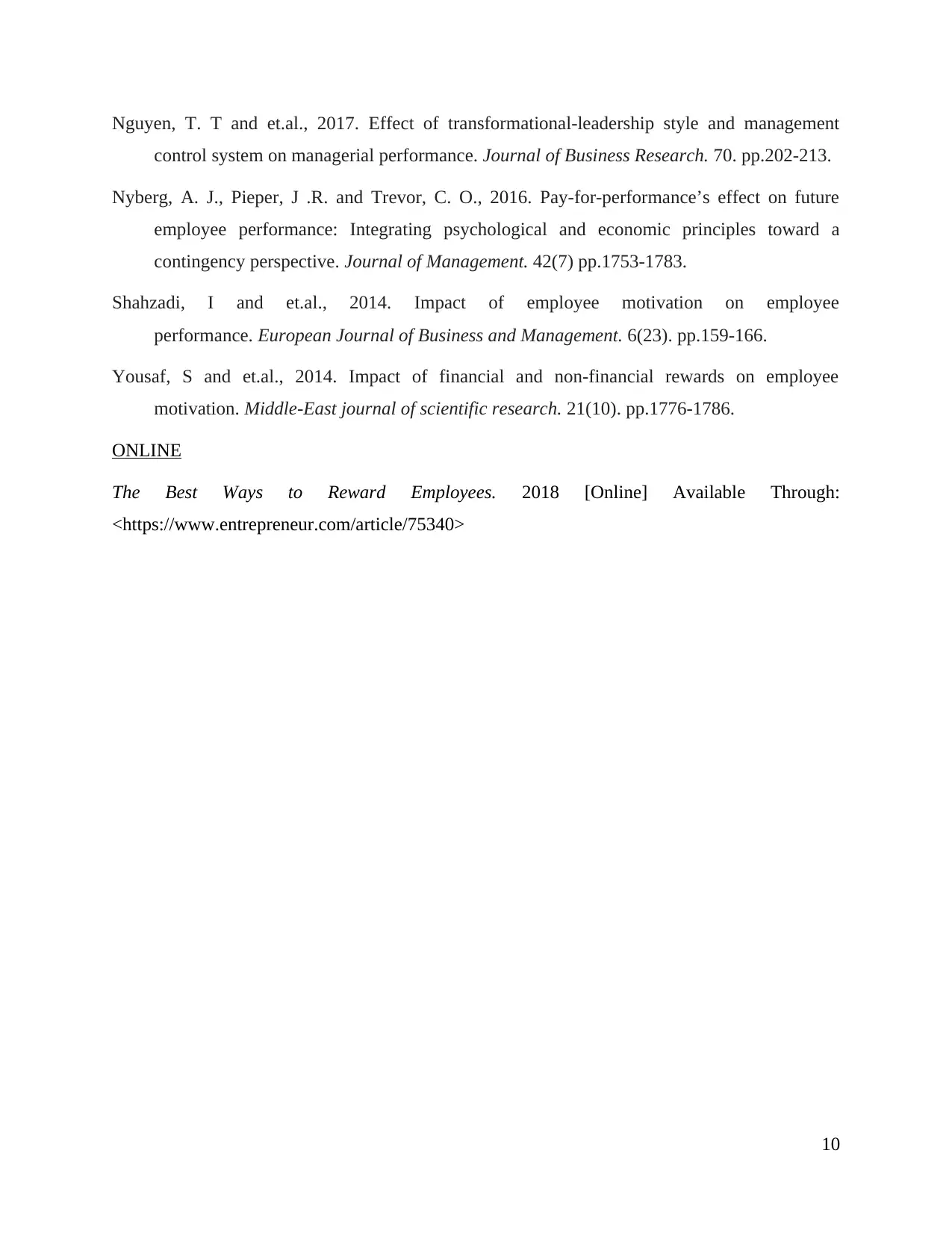
Nguyen, T. T and et.al., 2017. Effect of transformational-leadership style and management
control system on managerial performance. Journal of Business Research. 70. pp.202-213.
Nyberg, A. J., Pieper, J .R. and Trevor, C. O., 2016. Pay-for-performance’s effect on future
employee performance: Integrating psychological and economic principles toward a
contingency perspective. Journal of Management. 42(7) pp.1753-1783.
Shahzadi, I and et.al., 2014. Impact of employee motivation on employee
performance. European Journal of Business and Management. 6(23). pp.159-166.
Yousaf, S and et.al., 2014. Impact of financial and non-financial rewards on employee
motivation. Middle-East journal of scientific research. 21(10). pp.1776-1786.
ONLINE
The Best Ways to Reward Employees. 2018 [Online] Available Through:
<https://www.entrepreneur.com/article/75340>
10
control system on managerial performance. Journal of Business Research. 70. pp.202-213.
Nyberg, A. J., Pieper, J .R. and Trevor, C. O., 2016. Pay-for-performance’s effect on future
employee performance: Integrating psychological and economic principles toward a
contingency perspective. Journal of Management. 42(7) pp.1753-1783.
Shahzadi, I and et.al., 2014. Impact of employee motivation on employee
performance. European Journal of Business and Management. 6(23). pp.159-166.
Yousaf, S and et.al., 2014. Impact of financial and non-financial rewards on employee
motivation. Middle-East journal of scientific research. 21(10). pp.1776-1786.
ONLINE
The Best Ways to Reward Employees. 2018 [Online] Available Through:
<https://www.entrepreneur.com/article/75340>
10
1 out of 12
Related Documents
Your All-in-One AI-Powered Toolkit for Academic Success.
+13062052269
info@desklib.com
Available 24*7 on WhatsApp / Email
![[object Object]](/_next/static/media/star-bottom.7253800d.svg)
Unlock your academic potential
© 2024 | Zucol Services PVT LTD | All rights reserved.





